 |
Glenn Ligon, Untitled, 2016, From a suite of 17 archival pigment prints, Edition of 5 and 1 artist's proof, 71 x 49 inches.
Image via luhringaugustine.com.
|
What We Said The Last Time
February 27 - April 2, 2016
LUHRING AUGUSTINE
531 West 24th Street
New York, NY
From luhringaugustine.com:
Luhring Augustine is pleased to present What We Said The Last Time, an exhibition of new work by Glenn Ligon, and Entanglements, a curatorial project by the artist. A companion exhibition entitled We Need To Wake Up Cause That’s What Time It Is opened at Luhring Augustine Bushwick on January 16th and remains on view through April 17, 2016.
What We Said The Last Time features a suite of seventeen archival pigment prints that document the paint-spattered pages of the artist’s well-worn copy of James Baldwin’s seminal 1953 essay “Stranger in the Village.” Written during a stay in a remote Swiss mountain hamlet, Baldwin’s text examines complex and urgent questions around blackness, culture, and history. Since 1996, Ligon has used the essay as the basis of his “Stranger” series, including prints, drawings, and dense paintings made with oil stick and often coal dust that oscillate between legibility and obscurity. While creating these canvases, Ligon kept pages of Baldwin’s essay on his studio table for reference, and over the years they became covered with random smudges of black paint, oil stains, and fingerprints. Intrigued by this accumulation of marks, Ligon transformed the book pages into a suite of large-scale prints, using the full text of the essay for the first time in his career. The resulting work is a palimpsest of accumulated personal histories that suggests Ligon’s long engagement with Baldwin’s essay, as well as a new strategy in his ongoing exploration of the interplay between language and abstraction.
Also on view is Entanglements, a curatorial project by Ligon that examines how artists use the studio as a base from which to engage momentous cultural shifts and political events in both direct and oblique ways. Key to the exhibition is Bruce Nauman’s Violin Tuned D.E.A.D. (1969), a video that presents the artist repetitively playing a single note on a violin with his back to the camera. While discussions of Nauman’s video works from this period have focused on issues of performativity, endurance, and the body, Ligon was interested in how Nauman’s discordant note can be heard as a soundtrack to the war in Vietnam or the brutal violence faced by civil rights workers. While not directly commenting on these issues, the ominous soundscape of Violin Tuned D.E.A.D. nevertheless suggests Nauman’s engagement with that turbulent moment in American history and served as a point of departure for Ligon to consider other works in which the artist’s studio has acted as a conduit for contemporary events. Ligon’s selections posit new identities, conversations or modes of sociability as a response to pressing social and political issues. Entanglements features artworks and ephemera by Felix Gonzalez-Torres, David Hammons, On Kawara, Glenn Ligon, Bruce Nauman, Adrian Piper, Bob Thompson, Lynette Yiadom-Boakye, and Andy Warhol.
Glenn Ligon lives and works in New York. He received a Bachelor of Arts from Wesleyan University in 1982, and attended the Whitney Museum Independent Study Program in 1985. A mid-career retrospective of Ligon’s work, Glenn Ligon: America, organized by Scott Rothkopf, opened at the Whitney Museum of American Art in March 2011 and traveled nationally. Ligon has also been the subject of solo museum exhibitions at the Camden Arts Centre in London, the Power Plant in Toronto, the Walker Art Center in Minneapolis, and the Studio Museum in Harlem, among others. He participated in All the World’s Futures at the 56th Venice Biennale (2015), and he curated the group exhibition Glenn Ligon: Encounters and Collisions (2015) with Nottingham Contemporary and Tate Liverpool. Ligon’s work is held in the permanent collections of museums worldwide including Tate Modern, London; Centre Pompidou, Paris; Museum of Modern Art, New York; Whitney Museum of American Art, New York; National Gallery of Art, Washington D.C.; Walker Art Center, Minneapolis; Art Institute of Chicago; San Francisco Museum of Modern Art; and the Los Angeles County Museum of Art.
No comments:
Post a Comment